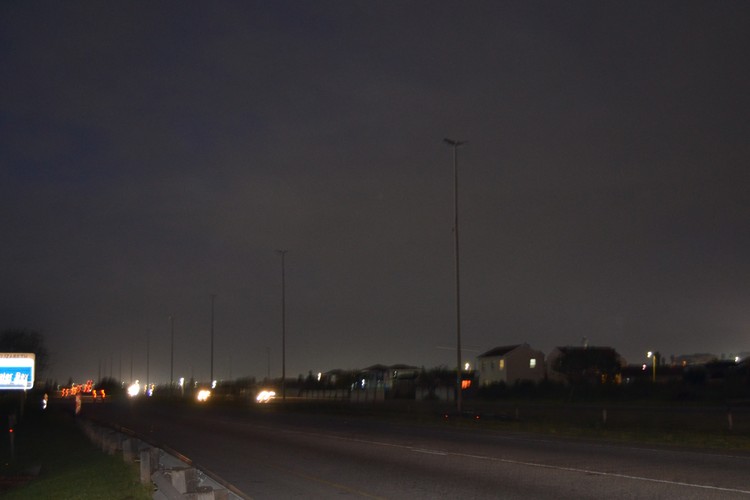
1 August 2024
Street lights on the N2 in Bluewater Bay, Gqeberha, are among many which are not working. Photo: Thamsanqa Mbovane
The Special Investigating Unit (SIU) arrived at the offices of the Nelson Mandela Bay Metropolitan Municipality last week to investigate “allegations of serious maladministration” in the municipality with regard to a street light tender. Areas across the metro have been in the dark due to widespread problems with street lights, some reportedly for several years.
About two weeks ago the SIU announced that it would probe the procurement of street lights and flood lights in the metro, “recover any financial losses” and investigate “unlawful or improper conduct by officials” in the municipality.
The SIU visited the municipality all last week, speaking to municipal officials, said SIU spokesperson Kaizer Kganyago. He said it was unclear when the investigation would be finalised as every case had its “complexities”. “They have always been cooperative. They have no choice,” he said.
An internal audit in the municipality from 2023 showed a flawed supply chain management process in two tenders for the supply, maintenance, and installation of street lights across the metro.
Though the municipality bought just over R180-million in stock, exceeding its budget by R24-million, large parts of the metro are still mostly in the dark, without working street lights on highways and in residential areas.
The municipality has frequently said that vandalism and theft were the reasons for the large backlog of street light repairs in the metro. This backlog stood at about 10,000 last year, according to the municipality’s Electricity and Energy Directorate.
Residents are concerned that the darkness contributes to crime. Resident Lungeka Williams said that most of the lights in her area in KwaNobuhle in Kariega are not working.
“We are scared at night,” said Williams. She said it is dangerous to walk to the shop at night.
Several high mast lights in Blue Water Bay in Gqeberha are off. Major roads in KwaNobuhle such as Mabandla, Matanzima, Jabavu, Ponana Tini, Bantom, also have poor lighting or darkness.
According to a ward councillor in Gqeberha, Terri Stander, there are 700 broken street lights in her ward. Some have not worked for the three years she has been ward councillor, and others reportedly for longer. “The community does not feel safe if it’s dark,” she said.
Stander said that in the past when they submitted the list of broken street lights to the municipality, they were told street lights had been repaired when this was not the case.
She said that the street light maintenance was often sub-contracted, which raised questions about whether the municipality was monitoring “where those lamps are going” and “who is doing what”.
Street lights which had been repaired, had quickly fallen victim to cable theft again, said Stander. “The electricity department also needs to take responsibility for its own infrastructure,” she said.
Cable theft is something that Community Policing Forum (CPF) member Johannes Weyers sees a lot in his ward in Kariega. He said thieves do not even have to run from the CPF because they can find cover in the darkness. “They don’t have to move, they can just stand still,” he said.
Weyers has been counting and sending reports of the broken street lights to his ward councillor. There are now over 200 broken street lights in his area, he said.
Local chair of the South African National Civic Organisation (SANCO) Nceba Plaatjie, said SANCO had been raising concerns about street lights with municipal officials and would convene a meeting with the municipality soon.
GroundUp sent questions to the municipality, which did not respond, and tried to reach Luvuyo Magalela, Electricity and Energy executive director and previously acting city manager, on the phone but he did not answer.